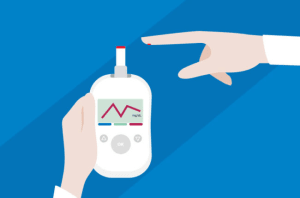
Glucose is a sugar that we obtain from food that circulates within our blood. We use this sugar as our body's main source of energy.
When we consume food, the sugar enters our body and moves from our digestive system to our blood stream. When our blood sugar concentrations increase, insulin is released from the pancreas and into our bloodstream. Insulin moves glucose from our blood into our cells, as this process happens our blood glucose levels return to normal. Excess glucose gets stored in our liver and muscles as glycogen. Glycogen helps our body remain in a stable state of homeostasis.
Our cells need insulin and glucose to remain healthy. Too much or too little blood glucose to lead to a variety of health problems, not just diabetes. In a fasted person, without diabetes, healthy blood sugar levels should be between 70-99 mg/dL. 1 to 2 hours after a meal, a healthy person's blood glucose levels should rise no greater than 140 mg/dL. In a person with diabetes, blood glucose levels will be slightly higher compared to a normal person.
Hyperglycemia is a condition of high blood glucose levels in our blood. This condition occurs when there is not enough insulin in our body and glucose cannot enter the cells. This causes a buildup of glucose in our bloodstreams. Consistent hyperglycemia can lead to insulin resistance. Insulin resistance reduces our cell's sensitivity to insulin as well as the amount of glucose our cells will absorb.
Hyperglycemia can be problematic both short and long term. Common symptoms of hyperglycemia include dry mouth, frequent urination and increase thirst. Some other symptoms of fatigue, lightheadedness, blurred vision, headache or nausea may other occur. Persistent hyperglycemia can develop into type 2 diabetes and cause an array of other serious problems. Full vision loss, kidney disease, foot ulcers, permanent nerve damage and an increase risk of heart attack or stroke to name a few.
Low blood glucose levels, also known as hypoglycemia, can also be an issue. Our body, especially our brain need a consistent supply of glucose. Hypoglycemia can be caused by diabetes, drinking alcohol with eating, anorexia, taking too much insulin, as well as some medications and illnesses. Low levels can cause symptoms like pale face, trembling hands or other body parts, sweating, heart palpations, confusion or disorientation, anxiety, or difficulty concentrating.
Maintaining our blood glucose levels is important for all people, especially people with diabetes. Diabetics are more prone to hyperglycemia and hypoglycemia, which can be fatal for them. Keep an eye on your blood glucose when visiting your doctor or monitoring at home. Simple lifestyle tips like eating at regular times, choosing water over sugary beverages, exercising at least 150 minutes per week and maintaining a heathy weight will all help keep glucose levels regular.
Contact us at Genesis Personal Fitness for more information on this topic or any health and fitness needs. We would love to help you reach your health and fitness goals!

